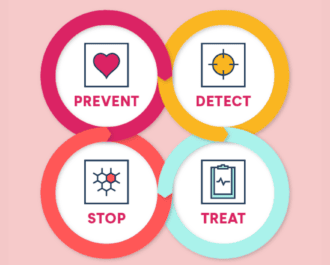
A new study has reported that we still do not know the best strategies to prevent heart failure in patients with HER2 positive breast cancer, a side-effect of treatment. The study reviewed published information about the outcomes of additional therapy to prevent heart disease completed by researchers from Australia, the United Kingdom and China, and published this month by Drs Lauren Brown and Thomas Meredith in the journal Cancers.
Whilst HER2 positive breast cancer can now effectively be treated with drugs such as trastuzumab and pertuzumab, the treatment unfortunately leads to heart complications in around 1 in 10 patients. This can be problematic as it may require interruption or cessation of effective cancer therapy, leaving affected patients with limited treatment options.
It is possible to use preventative treatments to protect the heart during and after cancer treatment. Beta-blockers and angiotensin-converting enzyme (ACE) inhibitors are often be used to lower blood pressure, and are generally a safe medication to use, even in conjunction with chemotherapy. However, these preventative strategies are not commonly used in conjunction with HER2 directed therapies.
To address this evidence gap, NBCF-funded Professor Elgene Lim (Garvan Institute, University of New South Wales) in collaboration with Dr Clare Arnott (George Institute, University of New South Wales) led a team to perform a detailed systematic review of the published literature. After screening over 2000 scientific publications, the team identified five clinical trials that had investigated prevention of heart disease in women treated with HER2 positive chemotherapy. These studies included over 900 patients and were completed in both early and metastatic disease. Overall, the evidence showed that there was no significant difference in the number of people who developed heart complications when they were treated with preventative heart medication, when compared to those on placebo. However, taking medications like beta-blockers did reduce the risk that chemotherapy would need to be interrupted, allowing patients to complete their treatment for a better survival outcome.
The authors concluded that there is currently not enough evidence to determine whether patients undergoing HER2 positive chemotherapy should also be treated with heart medications. Prof Elgene Lim elaborated, “Treatment interruption and cessation due to cardiac toxicity are important side effects that should be minimized in an era where HER2 directed therapies are so effective. With the development of next generation cardiac failure therapies, clinical trials focused on prevention of cardiac complications with these agents should be performed. Together with the George Institute, we plan to conduct a pilot study in this setting.”
The team hopes that this review will lead to more such trials, so that doctors and patients have the information they need to decide whether to add preventative heart treatment to their care.
Professor Lim is proudly funded through a National Breast Cancer Foundation Endowed Chair (EC-17-02).
More News Articles
View all News


